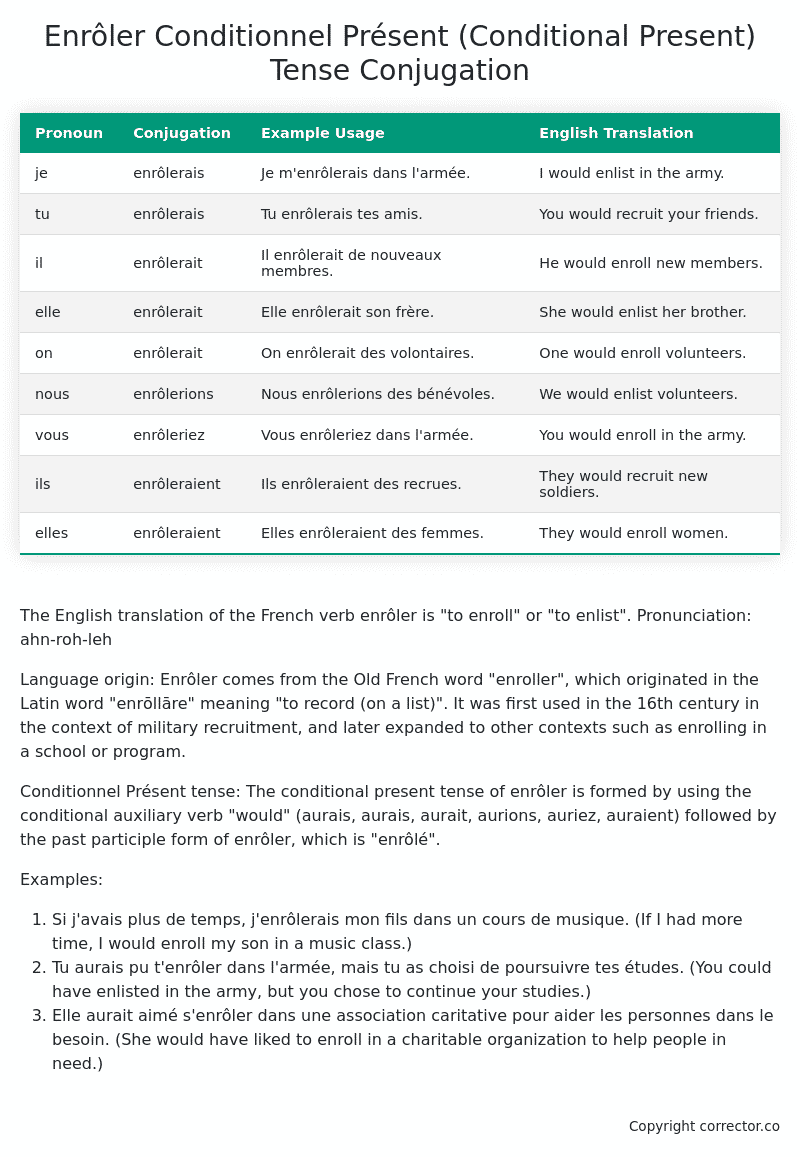Conditionnel Présent (Conditional Present) Tense Conjugation of the French Verb enrôler
Introduction to the verb enrôler
The English translation of the French verb enrôler is “to enroll” or “to enlist”.
Pronunciation: ahn-roh-leh
Language origin: Enrôler comes from the Old French word “enroller”, which originated in the Latin word “enrōllāre” meaning “to record (on a list)”. It was first used in the 16th century in the context of military recruitment, and later expanded to other contexts such as enrolling in a school or program.
Conditionnel Présent tense: The conditional present tense of enrôler is formed by using the conditional auxiliary verb “would” (aurais, aurais, aurait, aurions, auriez, auraient) followed by the past participle form of enrôler, which is “enrôlé”.
Examples:
- Si j’avais plus de temps, j’enrôlerais mon fils dans un cours de musique. (If I had more time, I would enroll my son in a music class.)
- Tu aurais pu t’enrôler dans l’armée, mais tu as choisi de poursuivre tes études. (You could have enlisted in the army, but you chose to continue your studies.)
- Elle aurait aimé s’enrôler dans une association caritative pour aider les personnes dans le besoin. (She would have liked to enroll in a charitable organization to help people in need.)
Table of the Conditionnel Présent (Conditional Present) Tense Conjugation of enrôler
| Pronoun | Conjugation | Example Usage | English Translation |
|---|---|---|---|
| je | enrôlerais | Je m’enrôlerais dans l’armée. | I would enlist in the army. |
| tu | enrôlerais | Tu enrôlerais tes amis. | You would recruit your friends. |
| il | enrôlerait | Il enrôlerait de nouveaux membres. | He would enroll new members. |
| elle | enrôlerait | Elle enrôlerait son frère. | She would enlist her brother. |
| on | enrôlerait | On enrôlerait des volontaires. | One would enroll volunteers. |
| nous | enrôlerions | Nous enrôlerions des bénévoles. | We would enlist volunteers. |
| vous | enrôleriez | Vous enrôleriez dans l’armée. | You would enroll in the army. |
| ils | enrôleraient | Ils enrôleraient des recrues. | They would recruit new soldiers. |
| elles | enrôleraient | Elles enrôleraient des femmes. | They would enroll women. |
Other Conjugations for Enrôler.
Le Present (Present Tense) Conjugation of the French Verb enrôler
Imparfait (Imperfect) Tense Conjugation of the French Verb enrôler
Passé Simple (Simple Past) Tense Conjugation of the French Verb enrôler
Passé Composé (Present Perfect) Tense Conjugation of the French Verb enrôler
Futur Simple (Simple Future) Tense Conjugation of the French Verb enrôler
Futur Proche (Near Future) Tense Conjugation of the French Verb enrôler
Plus-que-parfait (Pluperfect) Tense Conjugation of the French Verb enrôler
Passé Antérieur (Past Anterior) Tense Conjugation of the French Verb enrôler
Futur Antérieur (Future Anterior) Tense Conjugation of the French Verb enrôler
Subjonctif Présent (Subjunctive Present) Tense Conjugation of the French Verb enrôler
Subjonctif Passé (Subjunctive Past) Tense Conjugation of the French Verb enrôler
Subjonctif Imparfait (Subjunctive Imperfect) Tense Conjugation of the French Verb enrôler
Subjonctif Plus-que-parfait (Subjunctive Pluperfect) Tense Conjugation of the French Verb enrôler
Conditionnel Présent (Conditional Present) Tense Conjugation of the French Verb enrôler (this article)
Conditionnel Passé (Conditional Past) Tense Conjugation of the French Verb enrôler
L’impératif Présent (Imperative Present) Tense Conjugation of the French Verb enrôler
L’infinitif Présent (Infinitive Present) Tense Conjugation of the French Verb enrôler
Struggling with French verbs or the language in general? Why not use our free French Grammar Checker – no registration required!
Get a FREE Download Study Sheet of this Conjugation 🔥
Simply right click the image below, click “save image” and get your free reference for the enrôler Conditionnel Présent tense conjugation!

Enrôler – About the French Conditionnel Présent (Conditional Present) Tense
Formation
Common Everyday Usage Patterns
Expressing Polite Requests
Expressing Hypothetical Situations
Expressing Doubt or Uncertainty
Interactions with Other Tenses
Present Tense
Past Tense
Future Tense
Conditional Perfect
Summary
Want More?
I hope you enjoyed this article on the verb enrôler. Still in a learning mood? Check out another TOTALLY random French verb conjugation!


